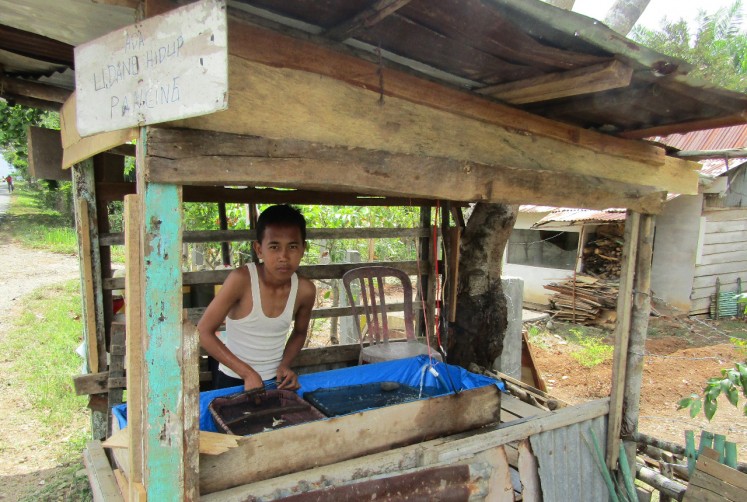Popular Reads
Top Results
Can't find what you're looking for?
View all search resultsPopular Reads
Top Results
Can't find what you're looking for?
View all search resultsWhat we can do to help those financially hit by COVID-19: Economist's take
Vivi Alatas, a renowned development economist in Indonesia and advisor for education platform IYKRA, has advice on how everyone in society can help soften the economic shocks suffered by the poor and those at risk of slipping into poverty.
Change text size
Gift Premium Articles
to Anyone
F
ood sellers operating around empty schools and offices have fewer customers than ever. Workers are not getting their daily income as factories and workplaces run understaffed. The low-income segment of the population has suffered the most from the economic slowdown driven by the COVID-19 pandemic.
Vivi Alatas, a renowned development economist in Indonesia and advisor for education platform IYKRA, has advice on how everyone in society can help soften the economic shocks suffered by the poor and those at risk of slipping into poverty.
The government has prepared for a worst-case scenario of zero percent economic growth, as the global supply chain has been disrupted. Finance Minister Sri Mulyani Indrawati said the baseline scenario was for the Indonesian economy to grow at above 4 percent this year, which would be its lowest growth rate in 15 years.
Businesses across Indonesia have complained of weak demand, with supply disruptions hurting the production process, resulting in the potential for layoffs.
Yang paling kasihan orang miskin, penjual keliling yang kehilangan pembeli, warung samping sekolah yang sepi, toko kelontong . Pada saat yang sama mereka yang paling rentan terkena dampak karena tidak punya pilihan social distancing dan berkurangnya penghasilan dengan drastis .
— vivi alatas (@vvalatas) March 20, 2020
Communities: What we can do
Donate to the poor. “Don’t wait for Ramadhan, don’t wait for Christmas,” Vivi wrote on her Twitter account @vvalatas.
“Use or create WhatsApp groups among neighbors to lift each other’s spirits [and] to help out others. Gather the contact numbers for vegetable, fruit, bread and food sellers around our community. Empower staple food shops around us to conduct delivery services and pay more.”
She also advised giving generous tips to ojek (online motorcycle taxi) drivers that serve us, and to be more charitable in general.
“Make sure there’s no one who is hungry around you. Give away rice, give away soap to wash hands,” wrote Vivi, a former World Bank economist. “Help supply the needs of healthcare and medical workers who fight on the front line.”
Only one out of five Indonesians is economically secure, according to the World Bank report Aspiring Indonesia. Around 24.8 million Indonesians live on under US$1 a day – 9.22 percent of the population – and over 60 million are vulnerable to falling into poverty.
Private sector: What companies can do
Vivi, the writer of Indonesia Jobs Report, also shared six tips on how companies can help contain the spread of COVID-19. First, make sure sanitation needs and personal protective equipment are sold at fair prices.
“This is not the time to maximize on profits. Sell with a fair price, to deter those who price gouge,” she wrote.
Second, give workers the opportunity to engage in social distancing. This can be done by avoiding close contact at the workplace or by conducting work from home.
“Transfer […] salaries now. Don’t wait for Idul Fitri, don’t wait for Christmas,” Vivi said.
Fifth, companies can identify their workers’ skills gaps. “It’s time to push employees to learn and improve their skills through online learning.”
Lastly, it is time for a massive corporate social responsibility initiative on helping the poor and vulnerable, while also helping the government to ensure it is prepared on the supply side, Vivi said.
Robi Anto, a junior high school student in Bengkulu, mans a humble stall selling live shrimp for bait, on November 15. (JP/Dedek Hendry)Public sector: What the government can do
The government can help by giving out aid in the form of cash and food and encouraging those who are not registered to sign up for health care by offering lower premiums.
“Indonesia has had the experience of providing [direct cash aid], so this can be done rapidly,” Vivi said. “By incentivizing [the public to sign up for health care], this could boost the number of those registered and the fees that could be collected from the health care system once this storm has calmed.”
Electricity mostly consumed by the middle to lower class could be free; non-taxable income could be increased and micro, small and medium enterprises could be given tax exemptions, she added.











